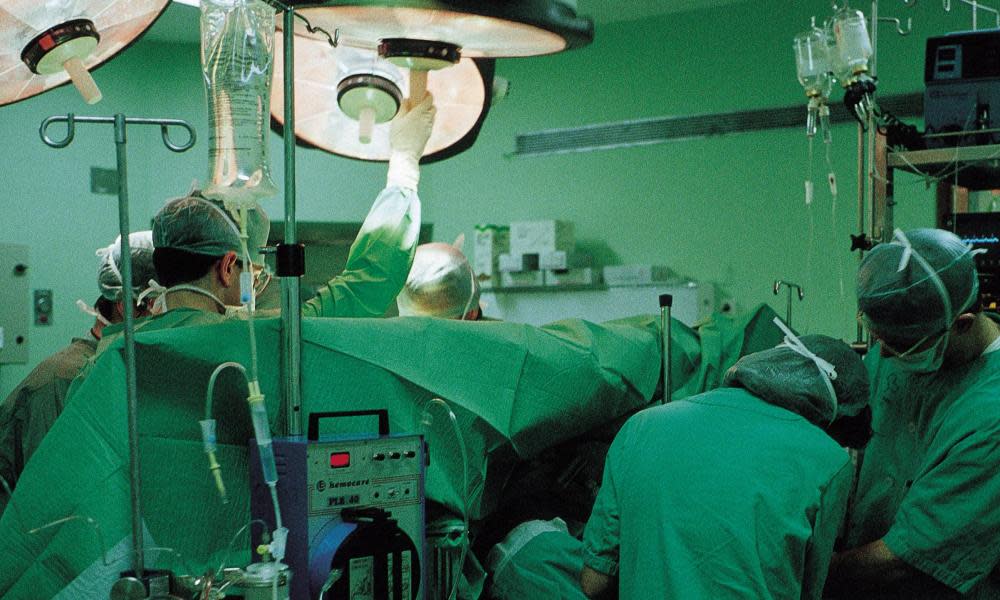The surgeon who signed patients’ livers was silly, not criminal. The law is an ass | Henry Marsh

Last Wednesday Simon Bramhall, a consultant surgeon specialising in liver transplantation, pleaded guilty in Birmingham crown court to “assault by beating”. He awaits sentencing. On two occasions during liver transplantation surgery – a highly complex and difficult procedure – he had signed his initials on the surface of his patients’ organs using an argon gas coagulator. If I understand the details of the case correctly, there is no suggestion that marking the liver in this way caused any damage to its function, so the effect was – so to speak – purely artistic.
Nevertheless, the judge said the question was one of “damage” to the surface of the patient’s liver, although not about damage to the patient’s feelings. It is worth noting that Bramhall had done this in full view of all of the surgical team. It was not surreptitious. The offence of “assault by beating” involves the use of “unlawful force”, and comes with a maximum of six months in prison and a possible fine of £5,000. The prosecuting barrister, James Badenoch, observed that the case was unique in legal history and quite without precedent. Bramhall had already been suspended over the incident four years earlier, and had subsequently resigned from his post. Punishment enough, you might think. Badenoch had gone on to state that Bramhall had shown a “disregard to the dignity and feelings of the unconscious patient” and the investigating CID officer after the verdict reiterated this and added that the patient in question had felt “violated” by what Bramhall had done. For myself, I have no objection to the fact there is a manufacturer’s logo on the titanium plate with which my broken left leg was fixed some years ago and which is still in place.
The offence had been discovered by another surgeon, who had reoperated on the patient some years later. The transplanted liver had failed, but this had nothing to do with the letters “JB”, which the second surgeon found on the failed liver as he removed it and inserted a new one.
All surgeons have skeletons in their cupboards of one sort or another, and we are often loath to denounce our colleagues
You may well wonder why the second surgeon felt obliged to report his discovery to the hospital authorities, as knowledge of the signature was the only thing that might conceivably distress the patient. All surgeons have skeletons in their cupboards of one sort or another, and we are loth to denounce our colleagues unless something especially egregious has taken place. When problems like this come to public attention, it often reflects animosity and conflict within a surgical department. If I have learned anything from my life as a surgeon, and the many countries in which I have worked, it is that the self-confidence that surgery requires can easily lead to excessive self-belief and bitter enmity between colleagues.
It is easy to become a little disinhibited when operating – the stress, intense concentration and excitement, and then the relief and sense of achievement if all has gone well, can lead to behaviour that, in the cold light of a courtroom or the gleeful unfrocking of the tabloid pages, appears crass and inappropriate. Besides, as a surgeon you have to be as emotionally detached as possible from the patient in front of you when operating. Empathy is the last thing you want. Early on in my career, my infant son underwent surgery for a brain tumour. If I had felt as desperate with anxiety for the children I operated on myself years later as I did in my son’s case, I would never have been able to do it.
I don’t think I was ever tempted to sign the skulls of any of the thousands of patients I have operated on, although I believe that a few years ago a US surgeon got into trouble for once so doing. It would have been wholly inappropriate, albeit harmless, and what Bramhall did was very silly indeed. I would not defend it for a minute. But is the law not also making an ass of itself in judging his actions to be criminal?
All surgeons are balanced on a difficult tightrope, between compassion and detachment. It is not entirely surprising if occasionally they fall off it. In recent decades there has been a growing recourse to using the criminal law against doctors. For many years it was used sparingly, although with increasing frequency, and only in cases of manslaughter caused by “gross negligence”, or in the rare cases, as with serial killer Harold Shipman and breast surgeon Ian Paterson, where doctors actually intended to harm patients. After the Mid Staffs nursing care scandal, the government introduced a new crime in the Criminal Justice and Courts Act of 2015 of “ill-treatment or wilful neglect”, greatly extending the reach of the criminal law into the practice of medicine. The case against Bramhall extends that reach even further.
It is not easy to be a doctor in the modern NHS – understaffed, over-managed, and under-resourced. We all accept that as patients, we must trust our doctors, and it is not always easy. Of course doctors must be held accountable, but what is less appreciated is that they also need to trust their patients and the society in which they work, if they are to function effectively. Clare Gerada recently wrote on this site how junior doctors in the NHS have become demoralised, as they have lost the systems of trust and support their predecessors had enjoyed. It seems that the same is now happening to the senior doctors. I do not see how the criminal prosecution of the foolish Simon Bramhall can do anything but harm.
• Henry Marsh is a neurosurgeon and author of Do No Harm: Stories of Life, Death and Brain Surgery

 Yahoo News
Yahoo News 
